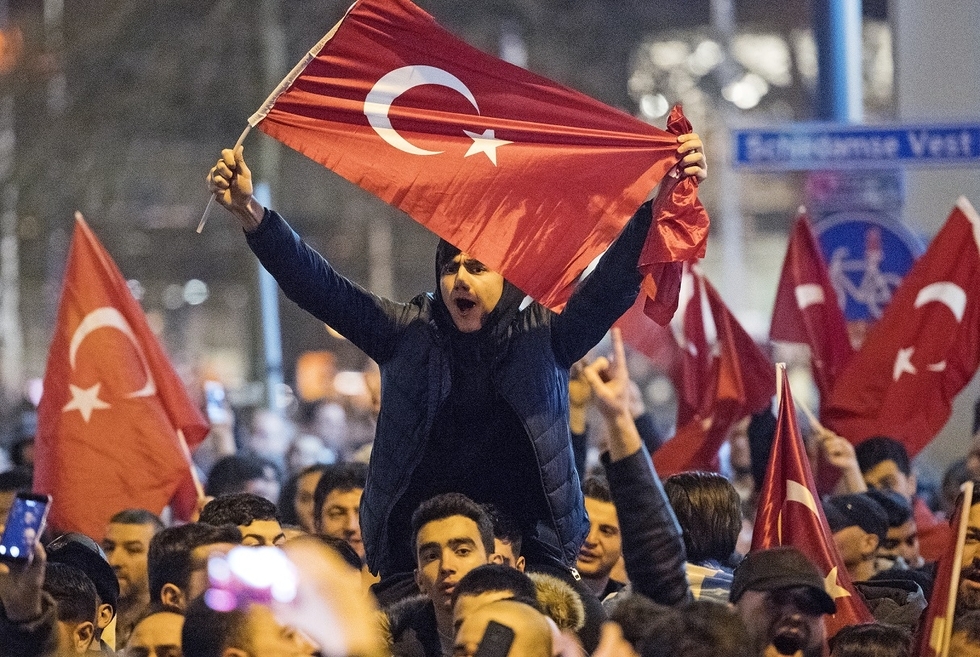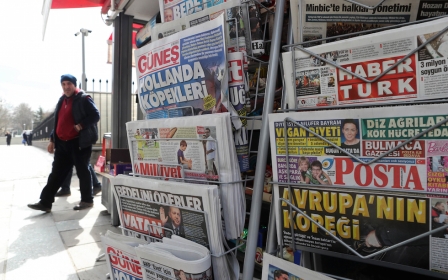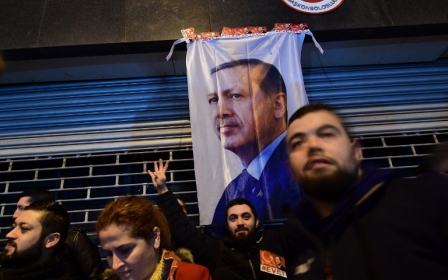Scapegoating Turkey: The Dutch disease could mark the death of liberal Europe

We are living in an age when truth is in its death throes. It is not even easy to defend factual information on any issue anymore.
We forget immediately. We make things up even faster.
There is now an entire profession invented for the sole purpose of administering the time in between the two: perception management. Fighting disinformation has become more valuable than acquiring knowledge. Europe is one of the flashpoints of this global crisis.
Following Brexit, Europe is now discussing whether the decision to leave meant bidding farewell to the 20th century order Europe with the US had built. Ironically, not many refer to the EU amid this discussion. Not many recall why the EU was founded in the first place and how European states lined up to join it either.
All actors, one way or another, seem to be busy with designing their own escapes. Only the nature of planned or mulled exits differ: some seek to exit by leaving the EU entirely whereas others break “free” from the EU’s longstanding principles and norms.
Dutch tragedy
Yet, no part of this controversy has been as tragic as the recent diplomatic scandal in the Netherlands.
There is one very simple and rudimentary rule in politics, which has been confirmed over and over: forgeries only multiply the power of the original.
It is painful to even start to describe how far the Dutch went off the rails before the general elections on 15 March. The Dutch government banned the pre-planned activities in the Netherlands for two state ministers of Turkey, a friendly NATO ally of the Dutch.
The Dutch government went even further and deported a Turkish minister, violating all international diplomatic norms. This all took place in the Netherlands where hundreds of thousands of Turks live, in order to prevent Turkish ministers from organising town hall meetings, of which many precedents had occurred seamlessly before.
Apparently, European liberalism has become so hapless and utterly unable to counter the current waves of racist fascism that it chose to desperately drum up its own brand of populism as ridiculous as its right-wing counterpart.
However, Europe’s liberals have failed to understand that they cannot fight racism by emulating or mimicking it.
There is one very simple and rudimentary rule in politics, which has been confirmed over and over: forgeries only multiply the power of the original. Leftists faking the right-wing, liberals mimicking fascists, and democrats aping populists have little to gain and much to lose. Brexit is the finest illustration of how such imitations end in pure fiasco.
This incident though is neither the first nor the only absurdity in the Netherlands. One must admit that that country has a rather high ceiling for ludicrousness. A similar incident of equal level of inanity occurred there last year.
Voting for your enemy
As investigations have shown, pro-Russian separatists in Ukraine shot down a passenger jet travelling from Amsterdam to Kuala Lumpur on 18 July 2014 using Russian Buk missiles. Three hundred passengers lost their lives. Although most victims were Dutch, the Netherlands went on to call for a referendum on the Ukraine-European Union pact on closer political and economic ties signed in 2014.
We are faced with a sorry eclipse of reason that ignores hundreds of thousands of Turks living in the country, and a NATO ally and strong trade partner in Turkey
One would expect the Netherlands to be the last country on earth to decide to hold a referendum on such an issue. In other words, you would not expect a country to hold a referendum on a pact with a country under attack from the same forces responsible for the killing of 200 of its citizens. This event in the Netherlands, however, is not an exceptional case. It is rather striking example of the nature and depth of the crisis in Europe.
In the end 61.1 percent of voters rejected the EU-Ukraine pact in the referendum compared to a “yes” vote of only 38.1 percent. Geert Wilders, infamous in Turkey and the Muslim world as the leader of the radical right-wing Party for Freedom (PVV), declared the result to be “a vote of no confidence by the people against the elite from Brussels and The Hague”.
To recall, a satirical magazine called GeenStijl had collected signatures and started the entire referendum debate. Thus, we are talking about such a tragedy where satirical magazines shape foreign policy, racists determine geopolitics, mealy-mouthed liberals are in the steering wheel of politics and a former punk rocker partly from Indonesia is defining Dutch nationalism. When these elements somehow come together, we are faced with a sorry eclipse of reason that ignores hundreds of thousands of Turks living in the country, and a NATO ally and strong trade partner in Turkey.
Crisis deepens
Unless Europe faces its shift to the radical right and spiralling populism, its state of crisis will only worsen. If they think that they can overcome the rising right-wing axis shift by finding a useful scapegoat in Turkey instead of truly facing the problem, they are wrong. British PM David Cameron had chosen the same path days before the Brexit vote and said: “They [Turkey] will probably get round to joining in about the year 3000 according to the latest forecasts.” His path ended in England without Cameron as well as an EU without the UK.
There is no escaping the fact that millions of Turks are today a natural part of Europe. They have lived in Europe for more than half a century now.
There is no escaping the fact that millions of Turks are today a natural part of Europe. They have lived in Europe for more than half a century now. The post-migrant Turks in Europe today overwhelmingly represent the third generation and are part and parcel of Europe in all meanings of the term. The fact that liberal multiculturalism generated subsidised ghettos in Europe does not alter this fact. That being said, these facts may not mean much for the racist and radical right-wing political wave.
Alarming levels of xenophobia and geopolitical crises in Europe worry the world more than any other global problem – and rightly so. For we all vividly remember how xenophobia in Europe in the past resulted in a horrible genocide and past geopolitical crisis in Europe ended in the bloodiest war in human history. If Europe surrenders to the right-wing wave in 2017 elections, its crisis will only deepen.
Turkey as scapegoat
The attempts to fill the election saddle with animosity against Turkey will not only aggravate relations with Turkey but also expedite the shift to the right. The growing number of countries in Europe either ruled by racist parties or where the latter are the coalition partner will undoubtedly create a domino effect. That may cause dire geopolitical risks not only in western Europe but also in the Balkans and Caucasus. Populism may yet be a subject of arm-chair discussion but it may turn into a major cause of geopolitical turmoil very soon.
Ardent defenders of Brexit played a crucial role in the 2016 Dutch referendum on Ukraine. That vote passed almost without notice. We are yet to figure out what sort of a Tsunami effect will arise from clueless decisions of the Dutch government straining Dutch-Turkish relations. One thing is for sure, and that is, as Spinoza of Amsterdam once said: “If the facts conflict with a theory, either the theory must be changed or the facts.’’ Approaches and practices in the last 30-40 years based on a theory of liberal Europe are in conflict with reality on the ground in Europe.
Either a new set of European values must be defined or facts on the ground must change. The story of those who seek a cheap exit by playing into “animosity against Turkey” instead of standing their ground and speaking up against the poisoning of Europe’s political and social climate is a sad one.
When geopolitical risks continue to grow and if crises deepen tomorrow, the cost of dispensing with Turkey as a stable partner may be heavier than imagined today. WIth political stress already building up in the North African-Mediterranean-Middle Eastern-Caucasian axes, the image of Europe escalating its tension with Turkey is utterly irrational.
- Taha Ozhan is a member of Turkish Parliament and chairman of Foreign Affairs Committee. He is an academic and writer. Ozhan holds a PhD in Politics and International Relations. He frequently comments and writes for international media. His latest book is Turkey and the crisis of Sykes-Picot Order (2015).
The views expressed in this article belong to the author and do not necessarily reflect the editorial policy of Middle East Eye.
Photo: People wave Turkish national flags during a demostration near the Turkish consulate in Rotterdam on 11 March 2017 after the Turkish Family Minister was barred by police from entering the Turkish consulate and escorted out of the country. (AFP)
Middle East Eye propose une couverture et une analyse indépendantes et incomparables du Moyen-Orient, de l’Afrique du Nord et d’autres régions du monde. Pour en savoir plus sur la reprise de ce contenu et les frais qui s’appliquent, veuillez remplir ce formulaire [en anglais]. Pour en savoir plus sur MEE, cliquez ici [en anglais].





